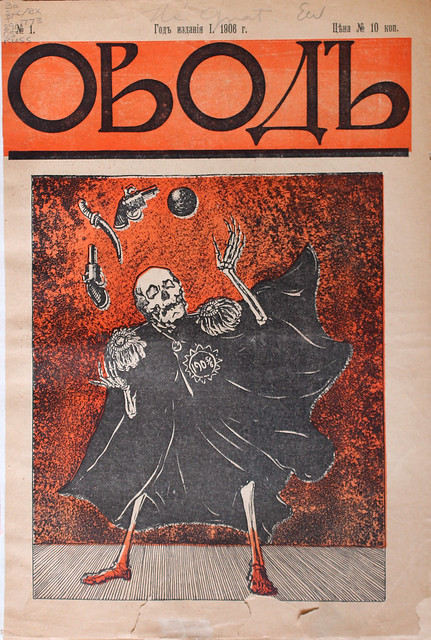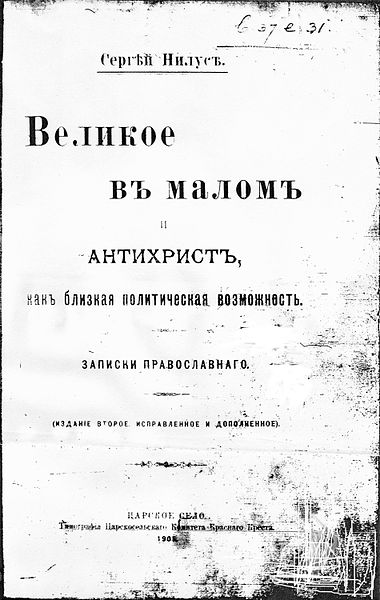Chapter 47: Terrorism in the Russian Empire, part VI: Terror without theory: radical Anarchists
Terrorism in the Russian Empire, part VI:
Terror without theory: radical Anarchists

As the Russian authorities struck hard against the Social-Revolutionaries and Social Democrats, terrorism in Russia begun to enter a new phase and take new forms. The rise of new kind of terrorists happened initially as a result of breakdown of even the weakest Empire-wide contacts between various local illegal party organizations and revolutionary cells. Left to their own devices, the surviving handfuls of disaffected SR and SD supporters united into small cells that formed loose federations, plunging into radical activity of every sort. Alienated from the intellectual exiled leaders who were unable to control or help their cause in any meaningful way, many revolutionaries drifted towards a radical ideology that had prophets and visionaries who preached an even harder creed than the Marxist and Neo-Populist revolutionaries. No compromises with the bourgeoisie, no concrete demands. Total war against all laws and courts, all private property owners, all religions and churches and every aspect of the old traditions and customs. To completely liberate man from all artificial restraints, one had to conduct a social revolution through direct action that aimed to totally destroy all state institutions. The Russian state had declared war on terror - and these terrorist cells were willing to escalate this conflict into a total war, slashing against the entire contemporary society and culture which they considered corrupt to the core. These were not the educated intellectual dissidents of former eras. The radical Anarchists were by and large poorly educated, and they often disregarded theoretical questions almost entirely.
To the most passionate and idealistic radical revolutionaries - the young students, craftsmen and the rootless drifters of the Russian underworld, theories mattered little as long as one had “boevaia zhilka” or “combat in his blood.” These reckless and frustrated youths were satisfying their desire of excitement and self-affirmation by fully immersing them to the world of revolutionary terror. To their kind every act of violence against political oppression in Russia was justified by the oppressive nature of the autocracy. This was an universal conflict between rebellious slaves and cruel masters, and as the liberators of an oppressed people these terrorists saw no need to justify their actions and methods to anyone. They waged an arbitrary war against the existing reality with pride, labelling calling their acts of violence “bezmotivnyi”, “motiveless” terror conducted in the spirit of “boevizm”, “total militancy.”
It did not matter that random and senseless their acts of violence appeared to be in the eyes of the bystanding Russian public. The Anarchists were willing to kill randomly and in large numbers and engaged to acts of terror that were repugnant to many non-Anarchist terrorist groups. Anyone wearing an uniform, all defenders of the tsarist regime deserved the death penalty. It was the duty of every Anarchist to fight against these political oppressors, and be just as ruthless and uncompromising in the struggle against the economic repression brought along by the very existence of private property. Their war against the old world included ideas. Clergy and “reactionary” intellectuals and thinkers were legitimate targets, just like the physical manifestations of the “spiritual enslavement” - statues and church buildings - were legitimate targets for destructions. Capitalists, industrialists, factory owners and managers were also all just agents of exploitation of the toiling masses of Russia. Everyone who supported the existing order actively was an enemy to be killed.
And thus all terrorist acts would contribute to the destruction of the bourgeois world in their own way, and the conflict between the authorities and the radicals was taken to its logical extreme - to the act of self-sacrifice.
The central SR doctrinal idea of the terrorist as an avenging martyr propagated by Gershuni had by 1905 spread through Russian revolutionary circles[1], but it had the most impact along the ranks of the most radical Anarchists. Initially the acts of “self-sacrificial terrorism” were just instances where terrorists opposing house searches or arrests first shot and threw bombs at the policemen and soldiers attempting to arrest them, finally ending their resistance by choosing to end their own lives with the last bullet rather than falling into the hands of the authorities. Expressing fanatical personal courage in the willingness to sacrifice their lives for the revolutionary cause soon became a notorious trademark of the most radical Anarchist terrorist cells. According to the murderous logic of these anarchist terrorists, individual terrorism was clearly incapable of defeating the autocracy. Thus the logical next step was “sensational mass assassination” of the forces of autocracy. By the virtue of contempt for organized political formations and because of their primary interest in the “unrestricted development of the individual”, these bezmotivniki initiated their attacks on personal initiative, suddenly and on whim. Isolated and broken away from the framework of any illegal political formation, these individuals banded together in small, loosely organized gangs of like-minded extremists. Initially ignored by the authorities as bandits and rabble, it was these clandestine groups that would soon transform the face of terrorism in Russia and rest of the world forever. The anarchist bezmotivniki were many things, but they were not afraid to die. And with dynamite and other modern explosives at their disposal, they now had entirely new means to throw their lives away and take others with them. The time of suicide attacks was about to begin.
1: Since Gershuni himself is still alive and free, he has much greater influence to the theoretical discussions within the revolutionary circles than in OTL.
Terror without theory: radical Anarchists

As the Russian authorities struck hard against the Social-Revolutionaries and Social Democrats, terrorism in Russia begun to enter a new phase and take new forms. The rise of new kind of terrorists happened initially as a result of breakdown of even the weakest Empire-wide contacts between various local illegal party organizations and revolutionary cells. Left to their own devices, the surviving handfuls of disaffected SR and SD supporters united into small cells that formed loose federations, plunging into radical activity of every sort. Alienated from the intellectual exiled leaders who were unable to control or help their cause in any meaningful way, many revolutionaries drifted towards a radical ideology that had prophets and visionaries who preached an even harder creed than the Marxist and Neo-Populist revolutionaries. No compromises with the bourgeoisie, no concrete demands. Total war against all laws and courts, all private property owners, all religions and churches and every aspect of the old traditions and customs. To completely liberate man from all artificial restraints, one had to conduct a social revolution through direct action that aimed to totally destroy all state institutions. The Russian state had declared war on terror - and these terrorist cells were willing to escalate this conflict into a total war, slashing against the entire contemporary society and culture which they considered corrupt to the core. These were not the educated intellectual dissidents of former eras. The radical Anarchists were by and large poorly educated, and they often disregarded theoretical questions almost entirely.
To the most passionate and idealistic radical revolutionaries - the young students, craftsmen and the rootless drifters of the Russian underworld, theories mattered little as long as one had “boevaia zhilka” or “combat in his blood.” These reckless and frustrated youths were satisfying their desire of excitement and self-affirmation by fully immersing them to the world of revolutionary terror. To their kind every act of violence against political oppression in Russia was justified by the oppressive nature of the autocracy. This was an universal conflict between rebellious slaves and cruel masters, and as the liberators of an oppressed people these terrorists saw no need to justify their actions and methods to anyone. They waged an arbitrary war against the existing reality with pride, labelling calling their acts of violence “bezmotivnyi”, “motiveless” terror conducted in the spirit of “boevizm”, “total militancy.”
It did not matter that random and senseless their acts of violence appeared to be in the eyes of the bystanding Russian public. The Anarchists were willing to kill randomly and in large numbers and engaged to acts of terror that were repugnant to many non-Anarchist terrorist groups. Anyone wearing an uniform, all defenders of the tsarist regime deserved the death penalty. It was the duty of every Anarchist to fight against these political oppressors, and be just as ruthless and uncompromising in the struggle against the economic repression brought along by the very existence of private property. Their war against the old world included ideas. Clergy and “reactionary” intellectuals and thinkers were legitimate targets, just like the physical manifestations of the “spiritual enslavement” - statues and church buildings - were legitimate targets for destructions. Capitalists, industrialists, factory owners and managers were also all just agents of exploitation of the toiling masses of Russia. Everyone who supported the existing order actively was an enemy to be killed.
And thus all terrorist acts would contribute to the destruction of the bourgeois world in their own way, and the conflict between the authorities and the radicals was taken to its logical extreme - to the act of self-sacrifice.
The central SR doctrinal idea of the terrorist as an avenging martyr propagated by Gershuni had by 1905 spread through Russian revolutionary circles[1], but it had the most impact along the ranks of the most radical Anarchists. Initially the acts of “self-sacrificial terrorism” were just instances where terrorists opposing house searches or arrests first shot and threw bombs at the policemen and soldiers attempting to arrest them, finally ending their resistance by choosing to end their own lives with the last bullet rather than falling into the hands of the authorities. Expressing fanatical personal courage in the willingness to sacrifice their lives for the revolutionary cause soon became a notorious trademark of the most radical Anarchist terrorist cells. According to the murderous logic of these anarchist terrorists, individual terrorism was clearly incapable of defeating the autocracy. Thus the logical next step was “sensational mass assassination” of the forces of autocracy. By the virtue of contempt for organized political formations and because of their primary interest in the “unrestricted development of the individual”, these bezmotivniki initiated their attacks on personal initiative, suddenly and on whim. Isolated and broken away from the framework of any illegal political formation, these individuals banded together in small, loosely organized gangs of like-minded extremists. Initially ignored by the authorities as bandits and rabble, it was these clandestine groups that would soon transform the face of terrorism in Russia and rest of the world forever. The anarchist bezmotivniki were many things, but they were not afraid to die. And with dynamite and other modern explosives at their disposal, they now had entirely new means to throw their lives away and take others with them. The time of suicide attacks was about to begin.
1: Since Gershuni himself is still alive and free, he has much greater influence to the theoretical discussions within the revolutionary circles than in OTL.
Last edited:



